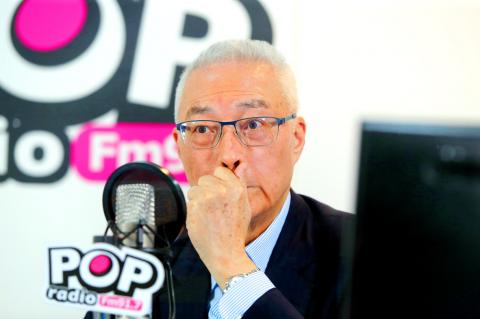Chinese Nationalist Party (KMT) Chairman Wu Den-yih (吳敦義) yesterday suggested that the party could “recruit” Kaohsiung Mayor Han Kuo-yu (韓國瑜) to join the party’s presidential primary.
The party’s plan to recruit Han would be a “fair” mechanism without hurting the party or Han, Wu said in a radio interview, but added that it would not do so if Han clearly refuses to join.
Asked how the party would decide on its nominee among many candidates, he said that the KMT prefers to conduct public opinion polls, instead of just among its members.

Photo: CNA
KMT headquarters on Wednesday granted a membership certificate to Hon Hai Precision Industry Co (鴻海集團) chairman Terry Gou (郭台銘) for lending the party NT$45 million (US$1.46 million at the current exchange rate) in 2016 without interest, Wu said, negating allegations that the move was aimed at helping Gou resolve his questionable membership so that he could take part in the primary.
After Gou received the certificate on Wednesday, he announced that he would participate in the party’s primary, saying that he would not accept being drafted to run.
He said that if he wins, he would stand as the KMT’s presidential candidate, and that if he loses, he would support whoever is selected.
Gou did not inform the party before announcing his decision to join the primary, Wu said yesterday, denying rumors that he and former president Ma Ying-jeou (馬英九) plotted for Gou’s participation to hinder Han.
Wu reaffirmed his objectivity, saying that he has decided not to contest the primary and that he would meet with Han, Gou and the other hopefuls — former New Taipei City mayor Eric Chu (朱立倫), KMT Legislator Wang Jin-pyng (王金平) and former Taipei County commissioner Chou Hsi-wei (周錫瑋) — to discuss the primary’s rules.
Referring to Wu’s remarks on recruiting Han, Chu said that the party’s primary plan “has changed from a romance film to an action movie to a science-fiction movie.”
He urged KMT headquarters to “provide a clear mechanism for the primary” to avoid losing supporters.
Wang also demanded a clearly defined primary mechanism, saying that it would allow candidates to feel secure in launching election campaigns.
Despite playing a role in helping Han win the mayoral election in November last year, Wang said that he would respect Han’s decision if he decides to enter the primary.
Gou yesterday said on Facebook that he anticipates a fair, just and open competition for the party’s nomination, adding that he would prove himself the best candidate during the primary.
Meanwhile, Han said that as mayor, his priority is to care about Kaohsiung’s residents and boost its economic development.
Additional reporting by Lin Hsin-han, Huang Chia-lin, Wang Jung-hsiang and Cho Yi-chun

A magnitude 7.0 earthquake struck off Yilan at 11:05pm yesterday, the Central Weather Administration (CWA) said. The epicenter was located at sea, about 32.3km east of Yilan County Hall, at a depth of 72.8km, CWA data showed There were no immediate reports of damage. The intensity of the quake, which gauges the actual effect of a seismic event, measured 4 in Yilan County area on Taiwan’s seven-tier intensity scale, the data showed. It measured 4 in other parts of eastern, northern and central Taiwan as well as Tainan, and 3 in Kaohsiung and Pingtung County, and 2 in Lienchiang and Penghu counties and 1

A car bomb killed a senior Russian general in southern Moscow yesterday morning, the latest high-profile army figure to be blown up in a blast that came just hours after Russian and Ukrainian delegates held separate talks in Miami on a plan to end the war. Kyiv has not commented on the incident, but Russian investigators said they were probing whether the blast was “linked” to “Ukrainian special forces.” The attack was similar to other assassinations of generals and pro-war figures that have either been claimed, or are widely believed to have been orchestrated, by Ukraine. Russian Lieutenant General Fanil Sarvarov, 56, head

‘POLITICAL GAME’: DPP lawmakers said the motion would not meet the legislative threshold needed, and accused the KMT and the TPP of trivializing the Constitution The Legislative Yuan yesterday approved a motion to initiate impeachment proceedings against President William Lai (賴清德), saying he had undermined Taiwan’s constitutional order and democracy. The motion was approved 61-50 by lawmakers from the main opposition Chinese Nationalist Party (KMT) and the smaller Taiwan People’s Party (TPP), who together hold a legislative majority. Under the motion, a roll call vote for impeachment would be held on May 19 next year, after various hearings are held and Lai is given the chance to defend himself. The move came after Lai on Monday last week did not promulgate an amendment passed by the legislature that

FOREIGN INTERFERENCE: Beijing would likely intensify public opinion warfare in next year’s local elections to prevent Lai from getting re-elected, the ‘Yomiuri Shimbun’ said Internal documents from a Chinese artificial intelligence (AI) company indicated that China has been using the technology to intervene in foreign elections, including propaganda targeting Taiwan’s local elections next year and presidential elections in 2028, a Japanese newspaper reported yesterday. The Institute of National Security of Vanderbilt University obtained nearly 400 pages of documents from GoLaxy, a company with ties to the Chinese government, and found evidence that it had apparently deployed sophisticated, AI-driven propaganda campaigns in Hong Kong and Taiwan to shape public opinion, the Yomiuri Shimbun reported. GoLaxy provides insights, situation analysis and public opinion-shaping technology by conducting network surveillance